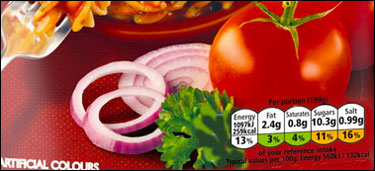Earlier this month, the Department of Health announced that a second wave of small and large businesses have privately joined the new hybrid labelling scheme, which has received mixed reviews since it began last June. Large suppliers like Mars, Nestlé and PepsiCo are already on board with the new system, as well as supermarkets like ASDA, Morrisons and Tesco. The developments will be encouraging for the government, who hope to implement a consistent nutritional labelling system across all food and beverages in the United Kingdom.
What is the new scheme?
You may have come across the new hybrid labelling scheme while browsing the aisles of your local supermarket. The labels use green, amber and red to indicate varying levels of fat, saturated fat, salt, sugar and calories found in the product. These hybrid labels are either printed directly onto the packaging, or applied with the same over labelling machines sold here at ALS.
This colour-coded system comes partly in response to growing concerns over health and obesity, particularly from consumer watchdog Which?, who has called for easier ways for customers to make healthy decisions. Health issues like obesity and poor diet cost the NHS Billions of pounds every year, and it’s hoped that a more consistent system will allow consumers to make informed decisions with just a glance at the packaging.
When will we see a change?
Although this second wave of suppliers has now joined the new scheme, it is difficult to anticipate when we will actually see changes to their packaging. Many producers are currently focusing on the changed required under the EU’s Food Information Regulation, which comes into effect on December 13th 2014.
It is likely that some suppliers will switch to the new hybrid labelling scheme when they make changes in line with the FIR, whereas others are expected to wait until their next packaging or labelling reviews next year.
How has the scheme been received?
It appears that the hybrid labelling scheme is beginning to gain traction, with more suppliers and supermarkets joining the scheme because their competitors have. However, research carried out last month would suggest that not everyone is sold on the idea just yet.
On behalf of the Chartered Institute of Marketing, YouGov surveyed over 2,000 consumers and executives across 100 food and drink companies with less encouraging results. The study reported widespread confusion and misinterpretation from consumers, with growing fears that the system demonises foods which are high in fat, salt or sugar. This could explain the reluctance which certain suppliers have taken towards the new scheme.
What’s next?
But despite this research, the government remain confident that the system will catch on. The Department of Health have expressed difficulties in quantifying the expected take-up, but based on discussions with this second wave of suppliers, they are predicting that two-thirds of pre-packaged food products will use the hybrid labelling scheme by next year.
Here at ALS we are industry leading manufacturers of over-labelling machines, but also offer a label design and application service for larger projects. If you’re interested in our over labelling service or machines, whether for food products or anything else, why not get in touch today?
